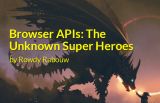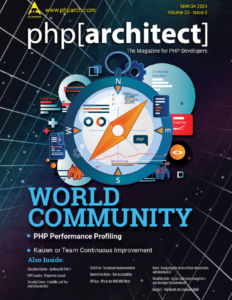Posts marked with “front end”
The Workshop: Laravel Livewire
Laravel Livewire describes itself as a “..full-stack framework for Laravel that makes building dynamic interfaces simple, without leaving the comfort of Laravel.” As a developer who has always struggled to feel comfortable with the latest and greatest front-end tooling, “without leaving Laravel” is incredibly appealing.
Security Corner: Enforcing Subresource Integrity
Any scripts or styles you include into your web application are called “subresources.” As these files can impact your application’s overall operation, it is critical for writing secure software that you ensure the integrity of any subresource loaded into the page. Otherwise, an untrusted party might inject malware, cryptocurrency miners, or another malicious payload into […]
Evolving to Modern Front-End with ReactJS
Using PHP templates to render all the HTML that makes a web application sometimes has drawbacks. Good client-side libraries in JavaScript exit to help build highly dynamic, reusable Web fragments and achieve optimal user interaction. This article introduces the ReactJS approach and a few hints for gently migrating some of the PHP-generated HTML code back […]
Encore, Encore, Bravo, Bravo! Combining Front End Development with PHP Using Symfony and Vue
PHP has been a leading language for web development for over twenty-five years, coexisting with HTML, CSS, and JavaScript to create a full front and back end application. JavaScript frameworks have skyrocketed in popularity, but it can often be challenging to see how to integrate these frameworks with your PHP web application. Symfony Encore gives […]
The Workshop: Twig, Bulma, and CodeIgniter 4
Last month, we covered getting started with a brand new CodeIgniter 4 project and explored the framework. We explained installation, routing, controllers, and built some models and migration to exercise the basics of working with a database. This month we’re focusing on the frontend of our CodeIgniter 4 example project by implementing a PHP template […]
Browser APIs: The Unknown Super Heroes
Do you still think browsers are only capable of parsing HTML, CSS, and JavaScript? Think again! Browsers have become much more powerful and contain numerous APIs that can enrich the user experience or are just plain fun. In this article, I’ll show you how to geolocate your users, check their battery status, measure device memory, […]
Advanced Design & Development
PHP adds syntax and slowly adapts to enable new programming techniques. Whether you are comfortable with imperative, object-oriented, or functional programming, the language does make it possible, and new syntax like arrow functions simplify the syntax. This issue looks into asynchronous PHP, new Browser APIs, building REST APIs, callables and closures in PHP, Code Igniter 4, and more!
Anatomy of a Browser
Browsers are everywhere, in a wide range of different devices. However, despite this, browsers mostly follow the same standards and operate in similar ways. Let’s take a look at what differentiates the various browsers, as well as what’s the same. Then, we’re going to go through the steps all browsers take to turn your markup into what users see.
The New Frontend Fundamentals
Eventually, we expose the services offered by the PHP-powered APIs we build to users. Unlike a decade ago when we could count potential client applications on one hand, today the potential client can be anything. But for most people-facing applications, it still means HTML output with images and CSS. In this issue, we have articles to help keep your CSS know-how up to date, your twig components re-usable, and your dynamic front-end code quick.
Advanced Caching for High Throughput Dynamic Sites
This article presents PHP-native caching options so developers can meet user expectations without needing to over-complicate the web stack.
![php[architect] logo](/wp-content/themes/phpa/images/new_logo_mark_nav.png)












